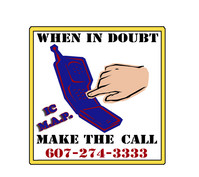 1- In what alcohol or drug-related situations can the MAP (Medical Amnesty Policy) be applied?
1- In what alcohol or drug-related situations can the MAP (Medical Amnesty Policy) be applied? 1- In what alcohol or drug-related situations can the MAP (Medical Amnesty Policy) be applied?
1- In what alcohol or drug-related situations can the MAP (Medical Amnesty Policy) be applied?
2- What is the slogan for the MAP? (Hint: It begins with: "When in Doubt....").
3- What phone number should be called on campus to summon help for a medical emergency situation?
4- Which campus office is responsible for applying the MAP to a case?
5. Name 2 symptoms of alcohol poisoning.
6. In which cases might the MAP not be applied?
7. How many medical amnesties can each student receive under the MAP?
Answers:
1- The Medical Amnesty Policy (MAP) applies to cases in which help is summoned for an alcohol or other drug-related medical emergency. If a student is concerned about a friend's condition, or his/her own condition, after consuming alcohol or another drug and calls for medical help, the MAP can protect both students from college judicial sanctions.
2- "When In Doubt, MAKE THE CALL."
3- 607-274-3333. This is the number for the dispatch of Public Safety. Officers will arrive at the scene to determine whether or not an ambulance should be summoned. They will write up an incident report, which will be sent to the Office of Judicial Affairs for review to determine whether or not the MAP will be applied. Then the student will be notified, and an educational referral will be made.
4- The Office of Judicial Affairs will review the case to determine if the requirements have been met for medical amnesty. No decision will be made before this review is completed.
5- Inability to be roused with loud shouting or vigorous shaking.
Mental confusion.
Low body temperature.
Weak, slow, or very rapid pulse.
Pale or bluish skin.
Slow or irregular breathing.
Excessive vomiting.
Seizures.
6- The MAP may not apply if other conduct violations occur during the same incident, such as disorderly conduct; if a required educational follow-up is not completed in a timely manner; if the student in need of assistance is simply found by authorities rather than friends calling for help in a proactive manner.
7- A student is eligible for only one amnesty. Repeated cases of high-risk consumption will necessitate additional intervention in order to provide services that the student may need.
For more information on the MAP, visit: www.ithaca.edu/sacl/healthpromotion/icmap/
https://www.ithaca.edu/intercom/article.php/20100930145655490